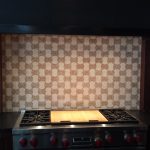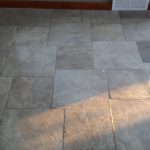
Selecting a type of grout that compliments the colors of this backsplash, while standing up to the heat of the cooking surface requires homework.
Selecting the right type of grout adds the final touch to a successful tile project. There are three basic types of grout for tile and variations of each. Whatever your goal for new tile in Madison WI, there’s a grout to complement the job.
In general, there are three classes of grout:
- Cementitious grouts – made from a Portland cement base
- Epoxy grouts
- Furan grouts
Because they are easier to work with and come in many colors, cementitious and epoxy grouts are popular with homeowners. Furan gouts are commonly black and use in commercial and industrial installations.
Grout seals the seams between all types of tile, preventing moisture from seeping down to the base layer. Hardworking, tile used with grout also plays a decorative role thanks to recent developments in color choices.
Examine Each Type Of Grout
Dividing grouts into product groups is easy because they’re created with different materials. Evaluating products within a group takes more information.
Begin with the popular variations of cementitious grout. These are the traditional grouting materials made from a mix of Portland cement, filler particles of different sizes, a water-retaining additive and color pigments. It is the color pigments that let you choose matching or contrasting grout for your tile of different colors and patterns. The water retention additive slows the drying time so the cement cures properly for maximum hardness.
A note of warning: these grouts can stain porous tiles. Professionals seal these tiles before grouting. That’s a step that isn’t necessary with standard glazed tile.
Within this large group of tiles you’ll find two common sub-divisions: Sanded and Unsanded.
- Sanded grout – it looks at feels gritty because there are sand particles in the mix. Sanded grout is most often used for installations where gaps between tiles are 1/8-inch wide or wider. That’s because the sand provides extra bonding power. Note – take care with highly polished tiles, the sand actually scratches the surface. Sanded grout is thicker than other alternatives. Therefore, it’s considered stronger.
- Unsanded grout – smoother because there are fewer, smaller powders not sand. Designed for 1/16- to 1/8-inch seams. Note – used in wider gaps, this type of grout cracks easily. Unsanded grout is usually recommended for vertical tile installations because it is extremely sticky so tile stays in place.
Understanding the difference between sanded and unsanded grout is particularly important for floor tile installation where wear adds extra stress on seams.
Both sanded and unsanded grouts are available in epoxy-based forms where, instead of reacting with cement, they use a chemical activator. The chemical reaction makes sanded epoxy grout very strong.
Epoxy Grout For Tile
Epoxy forms are the high-tech creations in the grout world. They’re strong, versatile and durable. Grout forms by mixing epoxy resins and a chemical hardener. The resulting mixture resists liquids and moisture so tile rarely need sealing. It’s ideal for wet areas in kitchens, bathrooms or laundry rooms. It’s used on walls, floors and most any surface.
One of the few drawbacks with epoxy is its rapid drying time. Once mixed it sets up fast so installation has to fast.. Professionals deal with this feature by doing large areas in sections.
Epoxy grout doesn’t scratch tile but professionals suggesting a test on a small tile sample to be sure there’s no staining. This type of grout can seriously stain porous and unglazed tiles. And, take note, epoxy tile grouts does get stained over time. So, plan on a cleaning routine. You can also look for grout cleaning services to do the job for you.
Epoxy grouts are available as sanded and unsanded however they use a different kind of sand.
Less Common Grout For Tile
There’s a hybrid version, too. Called modified epoxy it is basically an epoxy grout reinforced with Portland cement. This mix makes it react much like normal cement-based gouts however it is harder, stronger and more stain-resistant.
The least popular and least appropriate grout for homeowners is furan grout. Unlike epoxy it uses polymers of fortified alcohols. The name comes from one of its main ingredients, fufuryl alcohol. There’s no water in the two-part mix. An acid activates the grout – which can produce hazardous vapors. Not ideal for amateurs, it is unsurpassed for any application where chemicals, grease or extreme temperatures are a concern. As well as high-traffic areas where it is often used with brick pavers.
A Pro Knows The Best Type Of Grout
With years of experience and specialized training, a tile professional know the grout for tile that will make the task smooth and efficient. And a pro knows the shortcuts that work and those that don’t, too.
Contact Molony Tile for professional consultations and a complete selection of grout for tile. We’re Madison’s premier source for unique, durable and elegant tile solutions. Call or email Molony Tile, 608-268-8453 to discuss and choose exactly the right type of grout for your Madison WI home.

